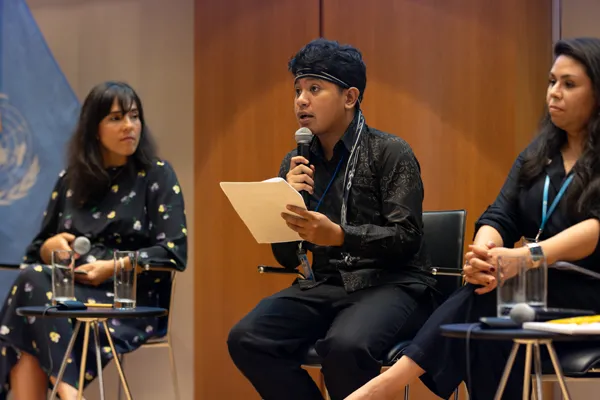Partnerships are critical for bridging the skills gap for vulnerable youth

At a side event during the United Nations’ recent High-Level Political Forum in New York, young people urged decision-makers to support youth in acquiring technical and entrepreneurial skills essential for securing employment or starting their businesses.
The youth employability event, Cooperation around youth skills for youth-led Sustainable Development Goal (SDG) achievement, was co-organized by SOS Children’s Villages, DHL Group, the International Labour Organization (ILO), and the Permanent Mission of Germany to the UN.
Speakers called for creating more partnerships such as YouthCan!, SOS Children’s Villages global employability and entrepreneurship program.
Under the umbrella of YouthCan!, SOS Children’s Villages partners with the private and public sectors to empower young people to become self-reliant. In 2023, YouthCan! benefited 18,000 young people globally with the support of around 300 partners, including four global partners, DHL Group, AkzoNobel, Siegwerk & TK Elevator.
Download YouthCan! Facts and Figures 2023
“What we need more are technical skills - those like hairstyling, working with wood, accounting, and engineering,” said Adi Soumena, 21, a member of the YouthCan! Youth Advisory Board from Indonesia, during the panel discussion.
“There is still a gap, and to close it, we need more partnerships to offer diverse opportunities for young people’s individual needs, especially for those with no university education.”
The need is especially great for young people without families who age out of care institutions at 18 or those who grow up in vulnerable families, says Paloma de Souza, 23, a YouthCan! Youth Advisory Board member from Brazil. “There are significant disadvantages when looking at things like education, mental health, social networks, protection, risk of poverty and even climate change,” she said.
“Among young people from vulnerable families, there are many who leave school – including young girls, due to early pregnancies or early marriages. Then, girls are not prepared to take care of their children. It is like a cycle,” Paloma concluded.
No one can do it alone
Annalena Edler, Deputy Head of the UN division of Germany’s Federal Ministry for Economic Cooperation and Development, said accelerating progress toward achieving SDG 4, to ensure inclusive and equitable education is something no actor can do alone.
“It needs to combine the efforts of governments, international organizations, the business sector and civil society. Combined efforts such as the cooperation between our development ministry, SOS Children's Villages and the DHL Group.”
Education and learning new skills are essential, she added. “Education and fostering skillsets not only help people get out of poverty and precarious situations but also gives peace, promotes gender equality, health and climate action.”
Cynthia Samuel-Olonjuwon, UN Special Representative from the ILO, another speaker on the panel, noted there were reasons to celebrate, namely that the global youth unemployment rate reached a 15-year low in 2023, falling to 13.8%.
269 million young people between the ages of 15 and 24 were still not in employment, education, or training in 2023, of which two out of three in this category are female.
“The problem is huge, no doubt about it. But we can celebrate because we're having some positive changes,” said Ms. Samuel-Olonjuwon. “[such as] what is happening with YouthCan!”
Ms. Samuel-Olonjuwon cited the importance of youth-led initiatives in addressing youth employability.
“The youth should be in the driver seat but if they cannot be in the driver seat they should be co-drivers… as we begin to not only understand what the issues are, but work together with the key policy makers to ensure that the key issues are addressed.”
An urgent need for more partnerships
Christoph Selig, Vice President of Corporate Citizenship of DHL Group, a YouthCan! global partner since the beginning, has said that the private sector must urgently do more to address youth unemployment.
“I urge the private sector to step up! By leveraging our unique skills, capabilities and assets, we can take responsibility and drive innovative solutions for the SDGs and beyond. Together with our non-profit partners, we can create a sustainable future for young people!”
Diana Rosales, Executive Director of SOS Children’s Villages Mexico explains that the partnership with DHL has helped many young people in Mexico, as 41% of young people between 15 and 25 do not have equal job opportunities, many of whom are women and girls.
Sofia Garcia Garcia, Head of Strategic Partnerships at SOS Children’s Villages International, emphasized that the mentorship provided by partner volunteers is all about creating meaningful human connections with young people, particularly those who need the most to be listened to, who are the furthest behind.
Next steps for YouthCan!
"What's next? Scalability. We want to reach many more young people, but we cannot do this alone. We need to do it with civil society, the corporate sector, and the public sector. So, we can provide an already working and improved model to many [more] young people," said Maria Berenguer, Head of Youth and ICT4D at SOS Children’s Villages International.
